- FLORIDA CAREER COLLEGE has been specializing in career training since 1982. Florida Career College continually maintains and develops programs and courses according to industry needs. The department identifies the skills needed for today's job market by working closely with the computer and software manufacturers, professional associations and employers.
School Highlights
Florida Career College-Miami serves 353 students (100% of students are full-time).
The college's student:teacher ratio of 12:1 is lower than the state community college average of 20:1.
Minority enrollment is 99% of the student body (majority Black), which is more than the state average of 67%.
Quick Stats (2025)
- Enrollment: 353 students
- Private-state tuition: $18,184
- Student:teacher ratio: 12:1
- Minority enrollment: 99%
- Source: Integrated Postsecondary Education Data System (IPEDS)
Top Rankings
Florida Career College-Miami ranks among the top 20% of public schools in Florida for:
Category
Attribute
School Resources
School Overview
The teacher population of 29 teachers has stayed relatively flat over five years.
Florida Career College-Miami
(FL) Community College Avg.
Carnegie Classification
Associates Colleges
Not applicable, not in Carnegie universe (not accredited or nondegree-granting)
Institution Level
At least 2 but less than 4 years
At least 2 but less than 4 years
Institution Control
Private for-profit
Private not-for-profit
Total Faculty
29 staff
139 staff
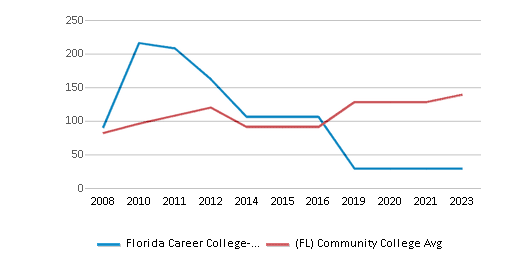
Number of Programs Offered
9
11
Student Body
The student population of Florida Career College-Miami has stayed relatively flat over five years.
The student:teacher ratio of 12:1 has decreased from 17:1 over five years.
The Florida Career College-Miami diversity score of 0.67 is less than the state average of 0.76. The school's diversity has grown by 36% over five years.
Total Enrollment
353 students
646 students
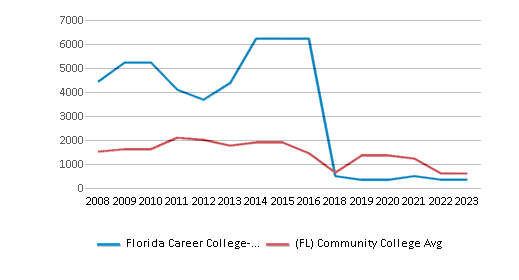
Student : Teacher Ratio
12:1
20:1
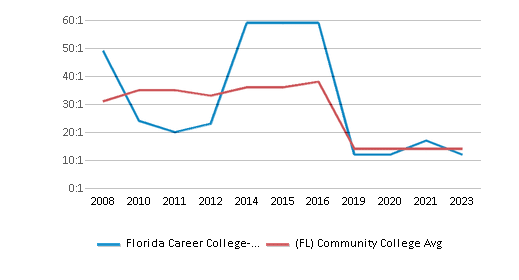
# Full-Time Students
353 students
587 students
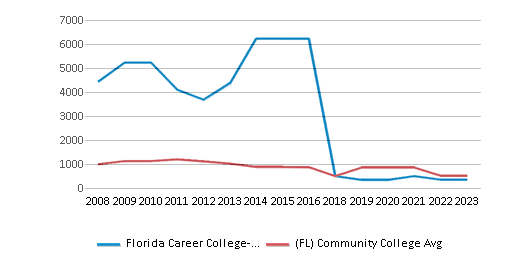
# Part-Time Students
n/a
557 students
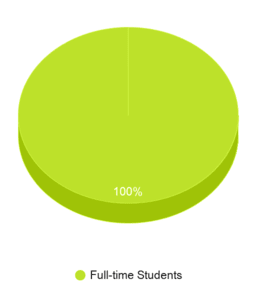
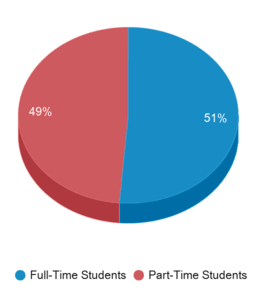
# Enrollment Undergraduate
516 students
261 students
# Full-Time Undergraduate Students
353 students
574 students
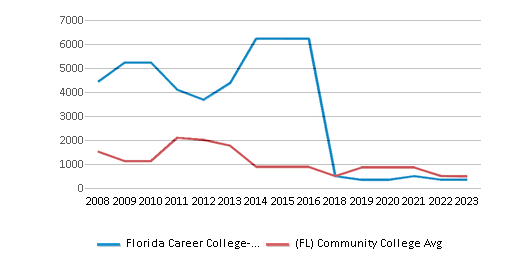
# Full-Time Graduate Students
n/a
85 students
# Part-Time Undergraduate Students
n/a
648 students
# Part-Time Graduate Students
n/a
36 students
Total Dormitory Capacity
n/a
174 students
% American Indian/Alaskan
1%
n/a
% Asian
21%
5%
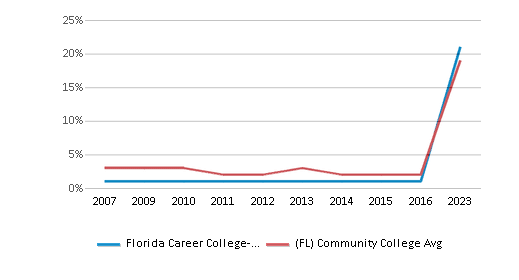
% Hispanic
n/a
30%
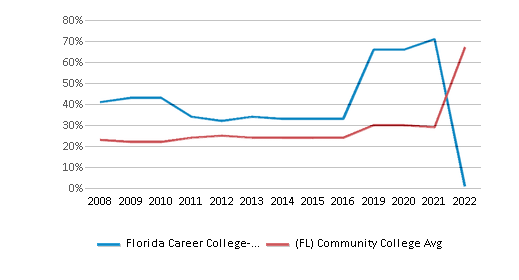
% Black
43%
19%
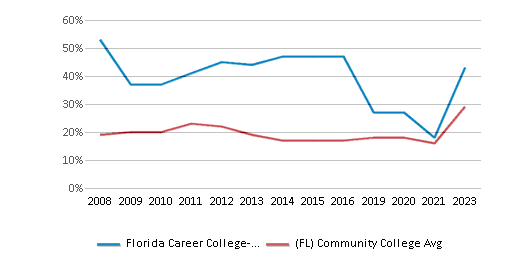
% White
1%
33%
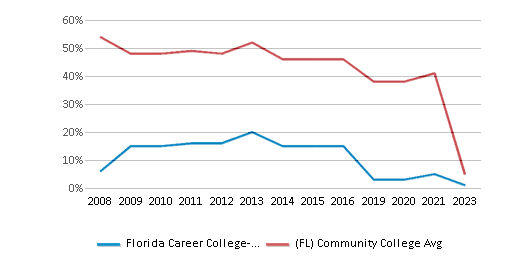
% Hawaiian
2%
2%
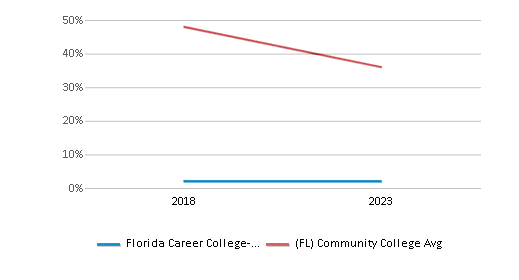
% Two or more races
32%
4%
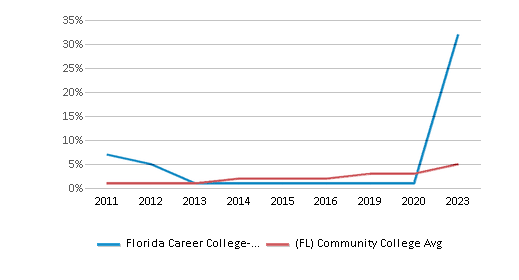
% Non Resident races
n/a
2%
% Unknown races
1%
5%
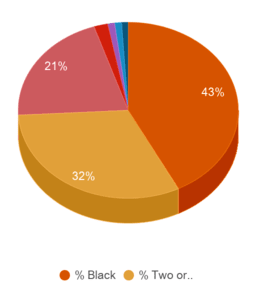
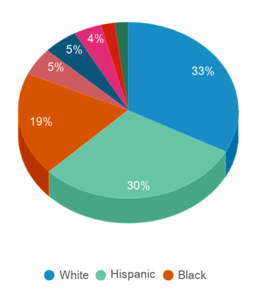
Diversity Score
0.67
0.76
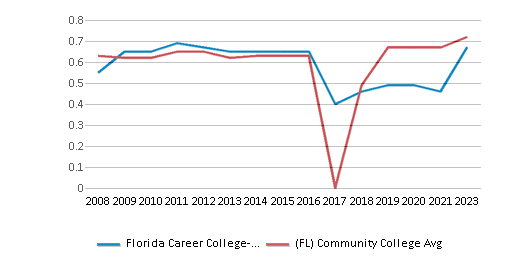
College Completion Rate (Students who graduate in less than 4 years)
0.6109%
0.6183%
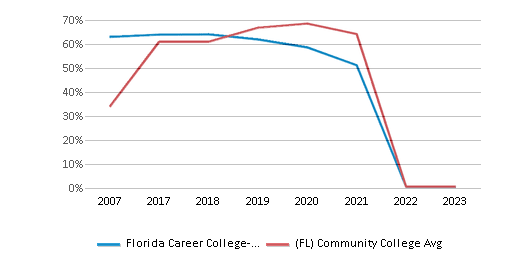
College Completion Rate (Students who graduate in 4 years or more than 4 years)
n/a
0.4334%
Average Graduate Earnings (10 Years)
$33,500
$31,500
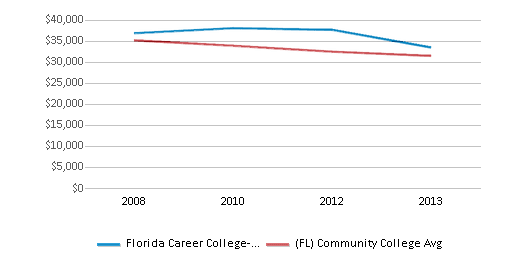
Tuition and Acceptance Rate
The private state tuition of $18,184 is more than the state average of $16,355. The private state tuition has grown by 8% over four years.
Private State Tuition Fees
$18,184
$16,355
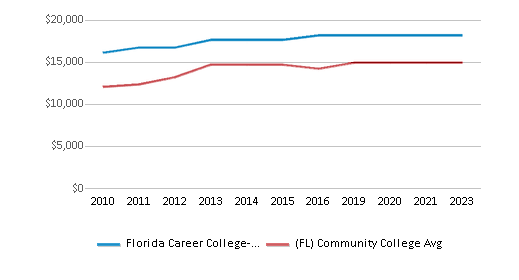
% Students Receiving Some Financial Aid
100%
88%
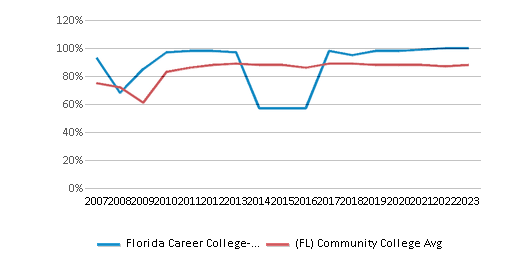
Median Debt for Graduates
$9,500
$9,750
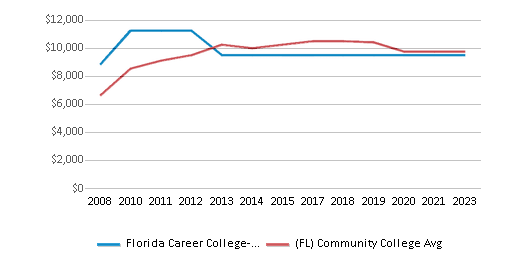
Median Debt for Dropouts
$3,975
$5,500
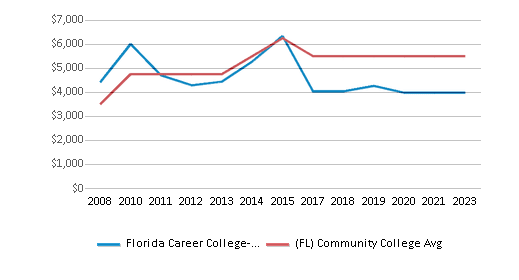
Acceptance Rate
n/a
94%
SAT Reading
n/a
442
SAT Math
n/a
429
ACT Composite
n/a
18
ACT English
n/a
18
ACT Math
n/a
18
Source: 2023 (or latest year available) Integrated Postsecondary Education Data System (IPEDS)
School Notes
- Founded as Florida Programming and Educational Center, Inc., the College's first classes began in September 1982 in Miami, Florida. In 1990, the School started using the name Florida Computer and Business School. Through the years, the school has grown and expanded with additional courses and programs to match student skills with the needs of the computer industry and business sectors. Florida Career College currently owns and operates five campuses. The main campus is located in Miami, Florida with four branch campuses located in Pembroke Pines, Florida, West Palm Beach, Florida, Lauderdale Lakes, Florida and Hialeah, Florida. All campuses are conveniently located near expressways, shopping malls, and restaurants. Florida Career College offers large, comfortable classrooms, computer labs with PC and Mac computers, Medical Labs, bookstore and a resource center. The resource center provides students and faculty with reference materials, including books, videos and periodicals to supplement textbooks and lectures. Also, each campus houses school offices for student services, financial services, and career center. The Miami campus is located at 1321 SW 107 Avenue, Suite 201B, Miami, Florida. The 28,000-square-foot facility is conveniently located across the street from Florida International University (F.I.U.) South Campus. Accredited by the Accrediting Council for Independent Colleges and Schools (ACICS) to award diplomas and Associate of Science degrees. The Accrediting Council for Independent Colleges and Schools is listed as a nationally recognized accrediting agency by the United States Department of Education.
Frequently Asked Questions
How much does Florida Career College-Miami cost?
Florida Career College-Miami's private state tuition is approximately $18,184.
What schools are Florida Career College-Miami often compared to?
Florida Career College-Miamiis often viewed alongside schools like Miami Dade College by visitors of our site.
What is Florida Career College-Miami's ranking?
Florida Career College-Miami ranks among the top 20% of community college in Florida for: Average community college minority breakdown and Percent of students receiving financial aid.
Recent Articles

Obtaining Your Bachelor's Degree at a Community College
Explore the evolving landscape of community colleges offering bachelor's degrees, addressing affordability, accessibility, and workforce needs.

A to Z of Community College Certificates and Courses
From business and healthcare to technology and skilled trades, the article showcases the breadth of options available to students seeking to enhance their knowledge, develop new skills, or pursue career advancement.

What is a Community College?
This comprehensive guide explains what a community college is, its history, and its role in higher education. It covers the types of programs offered, differences from four-year colleges, benefits of attending, and important considerations for prospective students, providing valuable insights for those exploring educational options.





